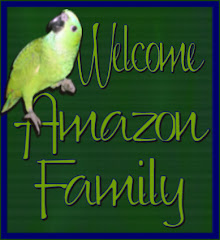
I took a lot of neurology classes in my master's level coursework, and they had found a very definite correlation between a child's activity level and neurological development. Concern being that kids who sit in front of the TV and are not physically active are at a high risk for Learning Disabilities and attention deficit disorder.
Makes one wonder what happens when birds are not allowed to fly when they are babies... does it impair their learning potential as well? So many are clipped and kept clipped as soon as they get feathers.
I have left my babies to be full flighted so that they had adequate time to develop their flying skills. I was told that it is important in allowing them to develop their heart and cardiovascular system. It is amazing to watch the babies go from crashing into everything, to making multiple controlled flights around the room and landing smoothly where they choose! I can see their mental development in this process as well. Inititally they take off without having any idea where they will end up to eventually clearly choosing their destination and making calculationsbefore they take off.
I have learned that I eventually needed to do a limited wing trim after they have mastered flight to keep them from spending all of their time up on the ceiling fan or the top of the speakers 11 feet off the ground. I just get too exhausted hauling out the ladder!! They are drawn to those high places, but clearly expect me to just fly up to join them! So after a month or so of flying, I trim the first four flight feathers slightly, to prevent them from gaining altitude but still allowing them to fly.
With Java and Kiwi, I only trimmed their wings that one time and now have left them full flighted. As long as they maintain a good attitude, I do not like to trim their wings, but I know that if they become too cocky, a wing trim and return to some kindergarten lessons might be in order. This picture is of Kiwi, who does love to fly up to the ceiling fans (which are NEVER turned on) but who comes down to me willingly fairly soon.
Makes one wonder what happens when birds are not allowed to fly when they are babies... does it impair their learning potential as well? So many are clipped and kept clipped as soon as they get feathers.
I have left my babies to be full flighted so that they had adequate time to develop their flying skills. I was told that it is important in allowing them to develop their heart and cardiovascular system. It is amazing to watch the babies go from crashing into everything, to making multiple controlled flights around the room and landing smoothly where they choose! I can see their mental development in this process as well. Inititally they take off without having any idea where they will end up to eventually clearly choosing their destination and making calculationsbefore they take off.
I have learned that I eventually needed to do a limited wing trim after they have mastered flight to keep them from spending all of their time up on the ceiling fan or the top of the speakers 11 feet off the ground. I just get too exhausted hauling out the ladder!! They are drawn to those high places, but clearly expect me to just fly up to join them! So after a month or so of flying, I trim the first four flight feathers slightly, to prevent them from gaining altitude but still allowing them to fly.
With Java and Kiwi, I only trimmed their wings that one time and now have left them full flighted. As long as they maintain a good attitude, I do not like to trim their wings, but I know that if they become too cocky, a wing trim and return to some kindergarten lessons might be in order. This picture is of Kiwi, who does love to fly up to the ceiling fans (which are NEVER turned on) but who comes down to me willingly fairly soon.


